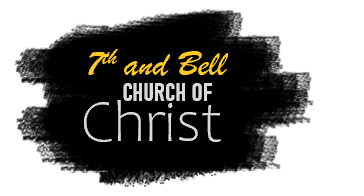
The Difference Between Bible Reading and Bible Study
I think many people will say that the difference between bible reading and study is the time involved. But this is inaccurate, for neither one must take longer than the other. The difference is not in time but in purpose. Bible reading takes you further through the text, while bible study takes you deeper into the text. A 30-minute reading will take you through the entire book of 1st John, while a 30-minute study may only take you through a few verses of the book. This exemplifies how the two methods complement each other, and how each is lacking without the other. If studying through 1st John verse-by-verse without having read through the book, then the study is short-sighted and nearly blind, for we cannot see the full scope of John’s message. However, reading through the book lacks a richer understanding of the message that bible study provides.
Other than the purpose of each, there are two key differences between bible reading and bible study: 1. The Effort Involved; 2. The Methods Used. Bible study requires a greater degree of effort than reading, this is one reason why bible study is not a practice of some Christians. But bible study also requires a method, a way, or direction of accomplishing it. Sometimes Christians have not acquired a Bible study method, which is the other reason why bible study is not practiced by some Christians. Unfortunately, some are not aware that the best and most effective methods of study are very simple and easy to do. Five years ago, I preached a short series here that covered some methods of study, and I’ve realized that it is high time to reassess this subject and provide good, enjoyable study strategies to our current group, as a good number of you weren’t here at that time, and those who were here have, by nature, forgotten some of these things. So, in the coming weeks, I hope to provide bulletin articles that explain a variety of methods for bible study that can be readily incorporated into a Christian’s life.
Paul encouraged Timothy in both reading and bible study. He told him to “give attention to reading, to exhortation, to doctrine” (1 Timothy 4:13). A devoted effort was to be given to both reading and doctrine, or teaching. Reading required mindfulness, and doctrine/teaching required closer examination or study. Then, in 2 Timothy 2:15, Paul told him to “Be diligent to present yourself approved to God, a worker who does not need to be ashamed, rightly dividing the word of truth.” To rightly divide means “to make a straight cut” (Vine’s dictionary) or “to set forth truthfully without perversion or distortion” (Mounce’s lexicon). The need to ensure a rightful dividing of the word of truth requires both careful reading and study of God’s word to make certain that what we believe, practice, and teach is, without doubt, the truth found in God’s word.
The Bereans give us another example of bible study, for Luke tells us that “these were more fair-minded than those in Thessalonica, in that they received the word with all readiness, and searched the Scriptures daily to find out whether these things were so” (Acts 17:11). The Bereans were fair and honorable in their treatment of God’s word, for not only did they receive the word “with all readiness” (a willing and eager mind), but they also “searched the Scriptures” day after day to confirm whether Paul was preaching the truth to them. The word “searched” (Greek – anakrino), literally means “to sift up and down; to make careful and exact research as in legal processes”. Luke’s word choices in the narrative reveal that the Bereans were in fact studying the bible (which was only the Old Testament text at that time), and they were doing so with great seriousness and diligence. Which is sensible (or fair-minded), for what matter is more important to examine and investigate than that of eternal salvation?
David knew the fruits of bible study when he illustrated the life of a godly man in the first psalm:
“Blessed is the man who walks not in the counsel of the wicked, nor stands in the way of sinners, nor sits in the seat of scoffers; but his delight is in the law of the LORD, and on his law he meditates day and night. He is like a tree planted by streams of water that yields its fruit in its season, and its leaf does not wither. In all that he does, he prospers.”
The “blessed” man is he that “meditates” on God’s word. To meditate (Hebrew – hagah), means “to be in continual contemplation over a matter” (Ancient Hebrew Lexicon). All Hebrew dictionaries agree that this word specifically relates to the murmuring, whispering, and uttering of that which is on the mind. This in itself is a method of bible study, for it applies additional effort into understanding that which has been read in God’s word.
The Ultimate Goal of Bible Reading and Study
Paul said to the church in Thessalonica, “For this reason we also thank God without ceasing, because when you received the word of God which you heard from us, you welcomed it not as the word of men, but as it is in truth, the word of God, which also effectively works in you who believe” (1 Thessalonians 2:13). The goal of bible reading and study is to have the truth of God’s word effectively work in us, change us, and transform our minds, ways, behavior, and words. The power of God’s word effectively draws us close to God, gives us understandings from His infinite knowledge, and fully lights our way. “Your word is a lamp to my feet and a light to my path” (Psalm 119:105).
Our Lord, Himself, spoke concerning the degree by which we “take heed” to the hearing of God’s word:
“‘If anyone has ears to hear, let him hear.’ Then He said to them, ‘Take heed what you hear. With the same measure you use, it will be measured to you; and to you who hear, more will be given. For whoever has, to him more will be given; but whoever does not have, even what he has will be taken away from him.’” (Mark 4:23-25).
What is the measure that we will use? If our measure abounds in bible study, then so will what we receive back from our efforts, and even more knowledge, understanding, and wisdom will be given to us, along with a clearer and more perfect transformation of the heart. But if we use no measure, even what we once had known and understood will be taken away from us. May we heed the warning of the Lord, and soberly recognize that it is God’s message to us that should matter to man more than all else. And because the message has been so freely handed to us, may we have eager minds peer into the mind of our God and Creator and find out all things that God has prepared for those who love Him (1 Corinthians 2:9-10).
Article by Tanner Campbell
